Home Entertainment
2001
The event
Occupying five floors of the New York Hilton & Towers
hotel on the Avenue of the Americas, Home Entertainment 2001 took place May 11-13, 2001.
Because of last year's cancellation, predictions for attendance numbers were cautious at
best. However, based on the crowds of music lovers packed in the hallways and elevators,
the show was a smashing success. Indeed, final attendance numbers were 12,387 visitors to
over 200 exhibitors in 80 rooms. Next year's show will be in New York again.
Most 2001 exhibitors (retailers and manufacturers alike)
chose to wow reviewers and attendees with their state-of-the-art components rather than
more modest and affordable offerings. For your intrepid correspondent, this meant genuine GoodSound!
pickings seemed slim. Still, endowed with his long, sharp nose, the mission proved
successful.
Your guy really hit the big time when he discovered The
World of Headphones exhibit. There, Tyll Hertsens of HeadRoom Corporation had set up the
largest display of headphones and headphone amps ever assembled under one roof. Good sound
for the short green ruled the day as far as the eye could see. But before we explore
Tyll's "World," let's take a look at some tantalizing appetizers that fit the
more traditional speaker-based-systems mold.
Choices
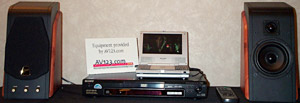 Ever price-conscious, Mark Schifter and his
partner Walter Liedermann, formerly with Audio Alchemy and now with Perpetual
Technologies, introduced the $299 per pair Diva by Swans M200 multimedia speaker.
The M200 is a two-way loudspeaker with a 5.25" mid/woofer and a silk dome tweeter.
It's finished in black, with walnut cheeks, and, despite its price, is an
honest-to-goodness audiophile speaker. It's self-powered, and thus sports a volume control
and bass and treble contour knobs. In its chic Euro livery, the high-performance M200
wowed the GoodSound! guy with far better sound than most computer speakers ever
dream of. While not as tiny and, consequently, as handicapped as most of the breed, the
M200's modest size is just right parked next to a computer monitor. Production models will
be available within 90 days, and a review pair is on order. Once they arrive, watch your
intrepid reporter turn his working computer into a movie screen or gaming platform. Ever price-conscious, Mark Schifter and his
partner Walter Liedermann, formerly with Audio Alchemy and now with Perpetual
Technologies, introduced the $299 per pair Diva by Swans M200 multimedia speaker.
The M200 is a two-way loudspeaker with a 5.25" mid/woofer and a silk dome tweeter.
It's finished in black, with walnut cheeks, and, despite its price, is an
honest-to-goodness audiophile speaker. It's self-powered, and thus sports a volume control
and bass and treble contour knobs. In its chic Euro livery, the high-performance M200
wowed the GoodSound! guy with far better sound than most computer speakers ever
dream of. While not as tiny and, consequently, as handicapped as most of the breed, the
M200's modest size is just right parked next to a computer monitor. Production models will
be available within 90 days, and a review pair is on order. Once they arrive, watch your
intrepid reporter turn his working computer into a movie screen or gaming platform.
Gallo Acoustics' Micro system not only looks great, it
sounds great. When the Micro was introduced, it proved so popular, the company decided to
focus its resources on it, discontinuing the high-end models that pioneered Gallo's unique
330-degree-dispersion CDT tweeter. 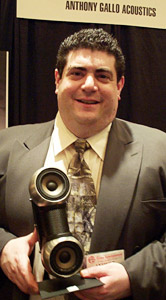 However, rumors persisted that
Anthony Gallo and partner Gary Pelled would eventually revive their patented
tweeter -- and in NYC, those predictions proved true: The patented "super"
tweeter is back. With a projected retail price of approximately $500 each, the Anthony
Gallo Acoustics Bravo is finished in black, white or, possibly, also stainless
steel. Predicted availability is end of third quarter 2001. At 10.25" long -- or
wide, depending on installation -- (a desktop bracket allows its use as computer,
bookshelf or television monitor, while custom stands support freestanding audiophile
applications) the Bravo sports a next-generation version of the CDT tweeter. The tweeter,
which features a tailored 180-degree dispersion from 60Hz to 20kHz, is sandwiched between
two Micro spheres. Their driver faces rotate outward along the longitudinal axis. System
sensitivity is a remarkable 93.4dB. GoodSound! was promised review units once they
become available. Don’t play with your marbles until then. However, rumors persisted that
Anthony Gallo and partner Gary Pelled would eventually revive their patented
tweeter -- and in NYC, those predictions proved true: The patented "super"
tweeter is back. With a projected retail price of approximately $500 each, the Anthony
Gallo Acoustics Bravo is finished in black, white or, possibly, also stainless
steel. Predicted availability is end of third quarter 2001. At 10.25" long -- or
wide, depending on installation -- (a desktop bracket allows its use as computer,
bookshelf or television monitor, while custom stands support freestanding audiophile
applications) the Bravo sports a next-generation version of the CDT tweeter. The tweeter,
which features a tailored 180-degree dispersion from 60Hz to 20kHz, is sandwiched between
two Micro spheres. Their driver faces rotate outward along the longitudinal axis. System
sensitivity is a remarkable 93.4dB. GoodSound! was promised review units once they
become available. Don’t play with your marbles until then.
Sony Corporation concentrated their active exhibits on SACD
demos, but showed two new DVD players on static display. The Sony DVP-NS700P ($399)
sports progressive scan and 480p output, as well as 12-bit/54MHz processors, CD-R/RW
playback compatibility and bass management. The downscaled Sony DVP-NS500V ($299)
retains CD-R playback capabilities and bass management, but eliminates progressive scan.
The Sony CDC-CE775 ($349) is a five-disc multichannel, CD/R-compatible SACD player
and will be available in September, while the Sony XE-670 single-disc version
($299) should bow in August.
On the subject of bass management, the folks from Outlaw
Audio were perturbed. Early adopters of first-generation DVD and SACD multichannel players
had noticed that the absence of proper bass management meant that full-range bass signals
were fed to small speakers in all channels, possibly causing damage or, at best,
distortion. At $249, the Outlaw ICBM is a slim, one rack-space unit
developed jointly with Dolby Laboratories. It offers user-selectable 40/60/80/100/120Hz
bass roll-off for the front L/R, front/rear center and surround L/R channels. The ICBM
also allows the division of a stereo bass signal. 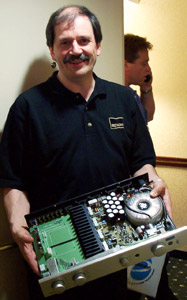 It can even direct
bass information simultaneously to both full-range main speakers and one or more
subwoofers. A front-mounted LFE control provides up to 10dB of boost, while the rear-panel
switch selects between 12dB and 24dB per-octave slopes. The purely analog ICBM will be
launched exclusively via the Internet. The campaign starts in July. Look at www.outlawaudio.com and www.av123.com. It can even direct
bass information simultaneously to both full-range main speakers and one or more
subwoofers. A front-mounted LFE control provides up to 10dB of boost, while the rear-panel
switch selects between 12dB and 24dB per-octave slopes. The purely analog ICBM will be
launched exclusively via the Internet. The campaign starts in July. Look at www.outlawaudio.com and www.av123.com.
High-performance budget brand Creek showed off their
"cost-no-object" 5350SE 85Wpc special edition integrated amplifier with full
remote. While the Creek 4330 mk2 40Wpc integrated amplifier ($595) is more
in line with GoodSound!’s traditional focus, the 5350SE ($1500, shown left)
and 75Wpc regular version ($1250) may prove to be stretch-the-purse contenders for
top performance. This brand is justly famous for packing a major punch into small,
unassuming boxes.
French firm Cairn showed very attractive electronics. A
quick glance at their complete line listing revealed that some of their products should
find their way into GoodSound!'s coverage shortly. For example, the Cairn DO
is a 50Wpc half-sized remote-controlled integrated amp with preamp-out and headphone jack.
It retails for $795. The Cairn LOCO is an 80W quarter-size monoblock amp at $395.
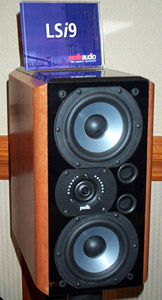 Polk Audio's Paul DiComo introduced their
new LSi Series of high-end speakers. This line includes six models: the LSi 7and
LSi 9 monitors, the LSi 15 and LSi 25 floorstanders with 8"
passive or 10" active side-firing woofers respectively, and the LSiC center
channel and LSiFX rears. Prices range from $800 to $3000 per pair. This makes the
5.25" two-way Polk Audio LSi7 GoodSound! material. A unique
feature common to the entire range is the use of an upscale ring-radiator tweeter normally
found on far more expensive loudspeakers. While the show officially unveiled the series,
it won’t be on dealers' shelves until November. Available finishes are cherry- or
ebonized-wood cheeks against black faces. Polk Audio's Paul DiComo introduced their
new LSi Series of high-end speakers. This line includes six models: the LSi 7and
LSi 9 monitors, the LSi 15 and LSi 25 floorstanders with 8"
passive or 10" active side-firing woofers respectively, and the LSiC center
channel and LSiFX rears. Prices range from $800 to $3000 per pair. This makes the
5.25" two-way Polk Audio LSi7 GoodSound! material. A unique
feature common to the entire range is the use of an upscale ring-radiator tweeter normally
found on far more expensive loudspeakers. While the show officially unveiled the series,
it won’t be on dealers' shelves until November. Available finishes are cherry- or
ebonized-wood cheeks against black faces.
The British electronics marque Alchemist always had a
penchant for stylish but unconventional appearances. Their new AA range is still très
chic but not as outré as certain earlier efforts. The Alchemist AA1 80W
dual-mono integrated amplifier ($1295), AC1 24/96 CD player ($1195) and --
not shown -- AT1 AM/FM/LW tuner with 51 presets ($995) looked mighty tasty. If
their sound follows suit, and our readers express an interest in spending a little extra
on appearance, you might soon see reviews of Alchemist AA components in GoodSound!.
Ditto for Odyssey. Based on designs originated by the
German Symphonic Line’s Rolf Gemein, the Odyssey products are manufactured
under license in the US. Smart manufacturing and direct sales allow head honcho Klaus
Bunge to sell them for significantly less than their Symphonic Line siblings. 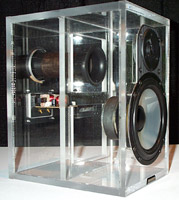 Based on the extraordinary performance of the $3200-for-three-components system
demoed, your guy felt strongly that you should at least know about this set-up. Call it GoodSound!
Plus priced. The complete Odyssey system heard at the show consisted of: Odyssey
Tempest full-function preamp including phono stage ($895); the SoundStage! Reviewers'
Choice Odyssey Stratos 150Wpc class-A/AB stereo amp ($995); and a pair of
as-yet-prototype and unnamed two-way speakers with Scan Speak drivers (approximately
$1295). Add a good CD player and cables and you’ve got yourself a very serious
$4000 system. Don’t you hate it when we spend your money so casually? Based on the extraordinary performance of the $3200-for-three-components system
demoed, your guy felt strongly that you should at least know about this set-up. Call it GoodSound!
Plus priced. The complete Odyssey system heard at the show consisted of: Odyssey
Tempest full-function preamp including phono stage ($895); the SoundStage! Reviewers'
Choice Odyssey Stratos 150Wpc class-A/AB stereo amp ($995); and a pair of
as-yet-prototype and unnamed two-way speakers with Scan Speak drivers (approximately
$1295). Add a good CD player and cables and you’ve got yourself a very serious
$4000 system. Don’t you hate it when we spend your money so casually?
Paradigm's Mark Aling talked your man through his
firm’s entire current loudspeaker line-up and handpicked six entry-level models
between $149 and $799 per pair for reviews to appear here shortly. He then jokingly
referred to the Paradigm Mini Monitor in display Lucite as a new model optimized
for see-through transparency.
The GoodSound! Bazaar
As promised earlier, the massive toothache/candy shop
convergence of affordable high-performance sound occurred in the HeadRoom "World of
Headphones" exhibit. Here your GoodSound! guy experienced aural bliss for
$380, via the HeadRoom Total Air Head amplifier ($159), Panasonic SL-CT
580 portable CD player ($99) and a pair of AKG K-401 headphones ($119).  He then spotted famous audio reviewer, jet setter and quad-lingual
watch-aficionado Ken Kessler test-driving a prototype of Grado's new entry-level
surround sound phones (two additional models will complete this forthcoming surround
series). The Grados utilize a large carved-foam earpiece and, via a proprietary Dolby Labs
algorithm, serve up multichannel surround sound for late-night solo movie ventures. He then spotted famous audio reviewer, jet setter and quad-lingual
watch-aficionado Ken Kessler test-driving a prototype of Grado's new entry-level
surround sound phones (two additional models will complete this forthcoming surround
series). The Grados utilize a large carved-foam earpiece and, via a proprietary Dolby Labs
algorithm, serve up multichannel surround sound for late-night solo movie ventures.
Asked for the greatest bang-for-the-buckaroo in cans
(studio slang for headphones), HeadRoom big Kahuna Tyll pointed to the Koss Porta Pro
Junior phones ($49). Another intrepid showgoer was promised instant Internet
immortality if he'd wear them for a quick publicity shot. He eagerly volunteered but we
didn’t catch his name.
OK, headphones. Why did your man get so excited?
Figure this. Powered from an appropriate amplifier (rather
than the ubiquitous op-amp hiding behind the mini jack or 1/4" jack found on
receivers, integrated amps or CD players), a good headphone setup will give you high-end
sonics at one-fifth to one-tenth the cost of a conventional
loudspeaker-based system. That’s because regular speakers must contend with room
acoustics, placement compromises and greater overall system complexity. Headphones avoid
crossovers, phase problems and room boundary reflections. Even cheap portable CD or DVD
players can sound awesome when an outboard amp buffers the headphones and prevents them
from loading down the source component.
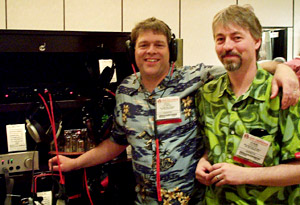 Tyll and compatriots (right)
recently discontinued their famous top-line Max headphone amp and, truly bent on
one-upping themselves, replaced it with the MadMax (completely dual mono with dual everythings).
That’s not the real name, but your guy feels that it should be, both for
performance and concept. Check out Tyll and partner as the boss gets down to the
tunes plugged into his no-hold–barred contender. The MadMax only gets mention here to
show how truly dedicated the HeadRoom folks are to superior sound regardless of budget.
Whether you have a $249 or $5000 total system budget, they're here to help. Tube or solid
state, dynamic or electrostatic, the folks from HeadRoom have it. They’ve made it a
point of honor to be the most complete one-stop shop for all things headphone-related.
Their thoroughly impressive "World of Headphones" kicked your GoodSound!
guy in the chest like a wild bronc. If rumors are to be trusted, this aural circus might
go on actual tour through the US. It would stop in all the major cities to allow music
lovers a first-hand sampling of what this on-the-go genre of music systems has to offer.
In fact, GoodSound! will soon teleport its writer to HeadRoom's headquarters in
Bozeman, Montana. Expect an in-depth report on what's available. Do we even have to
mention that we'll score a few cherry-picked source-amp-phones combos for review in the
process? $3000 sound for $500? Can't wait. Tyll and compatriots (right)
recently discontinued their famous top-line Max headphone amp and, truly bent on
one-upping themselves, replaced it with the MadMax (completely dual mono with dual everythings).
That’s not the real name, but your guy feels that it should be, both for
performance and concept. Check out Tyll and partner as the boss gets down to the
tunes plugged into his no-hold–barred contender. The MadMax only gets mention here to
show how truly dedicated the HeadRoom folks are to superior sound regardless of budget.
Whether you have a $249 or $5000 total system budget, they're here to help. Tube or solid
state, dynamic or electrostatic, the folks from HeadRoom have it. They’ve made it a
point of honor to be the most complete one-stop shop for all things headphone-related.
Their thoroughly impressive "World of Headphones" kicked your GoodSound!
guy in the chest like a wild bronc. If rumors are to be trusted, this aural circus might
go on actual tour through the US. It would stop in all the major cities to allow music
lovers a first-hand sampling of what this on-the-go genre of music systems has to offer.
In fact, GoodSound! will soon teleport its writer to HeadRoom's headquarters in
Bozeman, Montana. Expect an in-depth report on what's available. Do we even have to
mention that we'll score a few cherry-picked source-amp-phones combos for review in the
process? $3000 sound for $500? Can't wait.
Final note
The broad variety of sonic flavors on tap in the various
rooms of this show proved once again how subjectivity rules in audio. One fellow's ideal
is another's irritation. One gal's dream rig turns another's visual nightmare. This wealth
of choices makes the entire subject both exciting and confusing. GoodSound! will
attempt to describe various component core flavors succinctly enough to help you assemble
a short list of products in various budget sectors that might appeal to your personal
sensitivities.
|